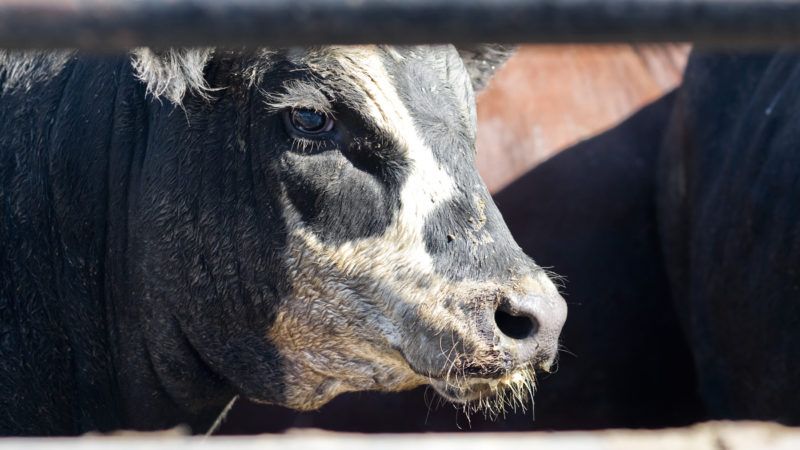COVID-19 Is Coming for Your Burgers
Plus: sensitive cellphone data swept up in coronavirus containment efforts, and more...

Meat processing plants around the country have been slowing or shutting down operations, and beef shortages could be coming soon, some industry officials say. Production last week was down by about 25 percent amid numerous plant closures due to COVID-19 outbreaks among employees.
"Two of the seven largest U.S. facilities—those with the capacity to process 5,000 beef cattle daily—are closed because of the pandemic," reports The Washington Post. And employee absences and social distancing measures are slowing production at the few that remain open.
Another issue for those in the pandemic-era beef business is that restaurants aren't buying, which means many of the more expensive cuts of meat they depend on selling simply aren't being purchased by anyone.
"What's selling? Freaking hamburger," John Bormann, program sales manager for beef and pork processor JBS, told the Post. "All of a sudden 23 percent of the animal isn't being bought because food service is gone."
"There's no evidence at all that there's any risk to consumers," Colorado Gov. Jared Polis stressed at a news briefing on Monday after JBS announced it would be closing its Greeley, Colorado, facility. "It's an issue within the plant."
FREE MARKETS
Politicians are playing the wrong role in handling COVID-19. "Contrary to what some lawmakers imagine, America's current pause is substantially self-imposed," suggests Charles Fain Lehman at the Washington Free Beacon, with data from public opinion polls to restaurant bookings and TSA screenings to back up the claim.
"Data show that America brought itself to a halt, reflecting more a fear of disease—and a sense of solidarity with those most at risk—than the following of government orders," Lehman writes. "If accurate, these data indicate that merely declaring the economy 'open' will not have a major impact. Rather, they suggest a successful reopening is less about making rules and more about helping Americans make informed decisions about what is safe for them to do."
The bottom line: Lawmakers do matter. But their role must be less about declaring specific things on or off limits and more about disseminating information, making citizens feel safe, and working with local businesses to craft policies that benefit everyone.
FREE MINDS
"Increasingly close cooperation between government authorities and technology companies" is never a nice phrase to read. The Washington Post details how these private-public partnerships against COVID-19 involve "data sets long considered so personal and sensitive—capable of revealing how smartphone users spent their days, and with whom—that many government officials shied away from their use out of fear of public backlash." More here.
QUICK HITS
Current Jail Incarceration Rate compared to March 1, 2020:
Chicago: -22%
New Orleans: -24%
LA: -26%
NYC: -26%
Seattle: -28%
San Francisco: -30%
Detroit: -34%https://t.co/MmPdIhqKES— Samuel Sinyangwe (@samswey) April 16, 2020
- Immigration and Customs Enforcement released almost 700 people from detention facilities yesterday, amid concerns over COVID-19 spread. "Nationally, there are about 90 confirmed cases of COVID-19 among ICE detainees," notes NPR, "and more than 20 cases among detention center employees, according to the agency."
- How Airbnb hosts are handling rentals during the pandemic.
- Instacart will start delivering prescriptions from Costco pharmacies.
- Just days after claiming he had total authority to tell state leaders how to handle lifting business and gathering restrictions, Trump reportedly told governors in a phone call yesterday, "you are going to call your own shots."
- Virginia and Kentucky saw small protests yesterday over social distancing and stay-at-home orders.
- Google is tweaking its videoconferencing options in good ways to compete with Zoom.


Show Comments (208)